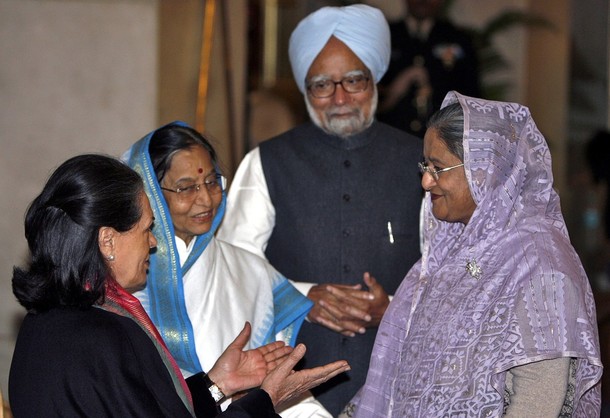
Anti-Indianism has been the mother’s milk of Bangladeshi politics ever since the BNP decided to make it the cornerstone of the party’s electoral appeal to the country in the 1970s. With anti-Indian governments in control of the national narrative for almost all of the time since, this alignment has had a devastating impact on Bangladesh’s political and social evolution.
Politically, it has made any rapprochement with India very difficult, even for governments who felt that better bilateral relations were in the national interest. The India card was always there to ensure that there would be a high electoral price to pay for such heresy. This tilt has disfigured Bangladesh’s domestic politics for the past 35 years and poisoned our relationship with the rest of the world. It is for this reason that fixing our relationship with India is in Bangladesh’s best interests and must be a top policy priority.
Thus, Sheikh Hasina has made the country’s India policy the centre-piece of her government’s policy agenda. She has done what no Bangladeshi prime minister has ever done before: put herself at immense political and personal risk to address India’s legitimate security concerns. Hasina is trying to communicate to New Delhi that it is a new day in Bangladesh. No longer will we try to make electoral advantage of opposing India. No longer will we claim that India is behind everything that happens, from the August 21 killings to the Pilkhana massacre. No longer will we permit our territory to be used for anti-Indian operations. No longer will we be obstructionist for the sake of opposing India, turning up our noise at deals that would benefit us merely because they would also benefit India.
Will the Bangladeshi prime minister’s charm offensive change things? Well, if you believe that Indian intransigence is due to the fact that they are intrinsically evil, then perhaps you would be hard to convince of the merits of her approach.
I think it is more persuasive to suggest that India will act in its own interests. In the past it has perceived its interests to dictate that it not cooperate with a neighbour it sees as hostile. But now that Bangladesh has demonstrated that we are no longer hostile, it is squarely within India’s interests to reciprocate and to ensure that this rapprochement continues.
That said, India should appreciate how much the Bangladeshi prime minister has risked to change the game with respect to the bilateral relationship. If India does not reciprocate in kind, it will miss a huge opportunity and will hand Sheikh Hasina’s domestic opponents a potent weapon to use against her.
What can the Indian government do to reciprocate?
One simple step that would win good will and build confidence would be to ensure that the Indian border security force stops gunning down Bangladeshi nationals. This would be easy to implement, and signal to Bangladesh that it is a new day in India, too.
A second point of concession should be trade. Again, the cost of fully opening up India’s markets to Bangladeshi businesses would be negligible, but the gains in terms of changing public opinion in Bangladesh would be incalculable.
The 250 megawatts of power and $1 billion loan for infrastructure development that have been pledged are a good start, but if the Indians really want to make inroads into Bangladeshi public opinion, BSF killings and duty-free market access are the places to start.
Bangladesh has done its level best to address India’s security concerns. We have shown that we are interested in connectivity and cooperation and that the days of self-defeating obstructionism are over. Now it is up to India to reciprocate in kind. This is a once in a generation opportunity.
If Sheikh Hasina’s charm offensive is allowed to fail, then it will destroy the ability of any future Bangladeshi government to make any similar overture to India, and our two countries will remain stuck in the vicious circle of non-cooperation that we have been in for the past 35 years.
I believe that Dr. Manmohan Singh is appreciative of what the Bangladeshi prime minister has risked. But he needs to take as big a step as Sheikh Hasina has taken to keep the momentum going. The stakes are high and the potential benefits — for both Bangladesh and India — are tremendous. But now the ball is in India’s court.
Zafar Sobhan is the Editorial & Op-Ed Editor for The Daily Star, Bangladesh’s leading English language daily newspaper. Photo credit: Reuters Pictures.
Image: sheikh-hasina-india-charm-offensive.jpg
